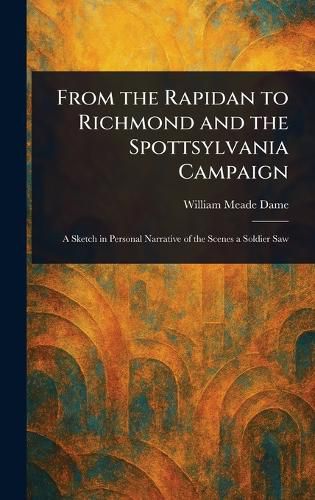Readings Newsletter
Become a Readings Member to make your shopping experience even easier.
Sign in or sign up for free!
You’re not far away from qualifying for FREE standard shipping within Australia
You’ve qualified for FREE standard shipping within Australia
The cart is loading…






This title is printed to order. This book may have been self-published. If so, we cannot guarantee the quality of the content. In the main most books will have gone through the editing process however some may not. We therefore suggest that you be aware of this before ordering this book. If in doubt check either the author or publisher’s details as we are unable to accept any returns unless they are faulty. Please contact us if you have any questions.
"From the Rapidan to Richmond and the Spottsylvania Campaign: A Sketch in Personal Narration of the Scenes a Soldier Saw" offers a compelling first-hand account of the American Civil War from the perspective of a Confederate soldier. William Meade Dame vividly recounts his experiences during the pivotal campaigns fought in Virginia, including the bloody battles along the Rapidan River and at Spottsylvania Court House.
This personal narrative provides valuable insights into the daily lives, struggles, and motivations of Confederate soldiers. Dame's recollections offer a ground-level view of military history, capturing the intensity and chaos of war. Readers interested in the Confederate States of America and the military history of the Civil War will find this book a rich and engaging resource. This meticulously prepared print edition allows readers to connect directly with a voice from the past, preserving a vital piece of American history.
This work has been selected by scholars as being culturally important, and is part of the knowledge base of civilization as we know it.
This work is in the public domain in the United States of America, and possibly other nations. Within the United States, you may freely copy and distribute this work, as no entity (individual or corporate) has a copyright on the body of the work.
Scholars believe, and we concur, that this work is important enough to be preserved, reproduced, and made generally available to the public. We appreciate your support of the preservation process, and thank you for being an important part of keeping this knowledge alive and relevant.
$9.00 standard shipping within Australia
FREE standard shipping within Australia for orders over $100.00
Express & International shipping calculated at checkout
This title is printed to order. This book may have been self-published. If so, we cannot guarantee the quality of the content. In the main most books will have gone through the editing process however some may not. We therefore suggest that you be aware of this before ordering this book. If in doubt check either the author or publisher’s details as we are unable to accept any returns unless they are faulty. Please contact us if you have any questions.
"From the Rapidan to Richmond and the Spottsylvania Campaign: A Sketch in Personal Narration of the Scenes a Soldier Saw" offers a compelling first-hand account of the American Civil War from the perspective of a Confederate soldier. William Meade Dame vividly recounts his experiences during the pivotal campaigns fought in Virginia, including the bloody battles along the Rapidan River and at Spottsylvania Court House.
This personal narrative provides valuable insights into the daily lives, struggles, and motivations of Confederate soldiers. Dame's recollections offer a ground-level view of military history, capturing the intensity and chaos of war. Readers interested in the Confederate States of America and the military history of the Civil War will find this book a rich and engaging resource. This meticulously prepared print edition allows readers to connect directly with a voice from the past, preserving a vital piece of American history.
This work has been selected by scholars as being culturally important, and is part of the knowledge base of civilization as we know it.
This work is in the public domain in the United States of America, and possibly other nations. Within the United States, you may freely copy and distribute this work, as no entity (individual or corporate) has a copyright on the body of the work.
Scholars believe, and we concur, that this work is important enough to be preserved, reproduced, and made generally available to the public. We appreciate your support of the preservation process, and thank you for being an important part of keeping this knowledge alive and relevant.